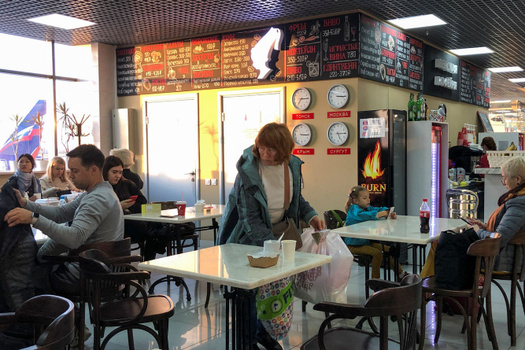
Not worth it Russia asks the EU nine questions about Navalny’s poisoning, arguing that he’s too unpopular to warrant assassination and, hey, maybe his own colleagues are responsible
Мы рассказываем честно не только про войну. Скачайте приложение.
Russia’s Permanent Mission to the European Union has urged EU officials and members of the European Parliament to “look into” nine supposed “inconsistencies” regarding the “incident which occurred with a Russian political activist and blogger Alexey Navalny,” who European experts say was poisoned with a Novichok-class nerve agent while traveling in Siberia on August 20. Acknowledging that its staff members are not toxicology experts, Russia’s EU Permanent Mission says Navalny’s sudden illness precipitated “a rapidly growing information campaign in the EU, both in official circles and the media.” Russia’s questions come in advance of a debate planned in the European Parliament about the attack against Navalny. Many of the questions from Russia’s EU Permanent Mission parrot talking points and conspiracy theories that have spread for weeks in the pro-Kremlin media and blogosphere.
“Navalny Two-Percent”
Russia’s second question to the EU recycles a common criticism of allegations that the Russian authorities tried to kill Alexey Navalny, implying that he’s too unpopular to warrant an assassination attempt. Here’s how Moscow’s EU Permanent Mission phrased it: “What would be the reason for the Russian authorities to poison Alexey Navalny, taking into account that his actual popularity level hardly reaches 2 percent, according to the recent survey conducted in July 2020 by the Levada Center, an independent, non-governmental polling and sociological research organization?”
The question apparently refers to this survey conducted in late July 2020, where sociologists recorded a 2-percent trust rating for Alexey Navalny. (Putin clocked in at 23 percent.) In a more recent poll also by the Levada Center, incidentally, Navalny’s trust rating rose to 4 percent (while Putin’s also jumped to 33 percent). The state-owned Russian Public Opinion Research Center put Navalny’s trust rating at 1.9 percent in July 2020 and 2.8 percent in August 2020 (while Putin scored 29.3 percent and 27 percent, respectively).
Kira Yarmysh, Navalny’s press secretary, pointed out that emphasis on Navalny’s supposedly low popularity implies that the opposition figure’s death would in fact benefit the Kremlin if he polled better. “Except we all understand that Alexey’s rating isn’t 2 percent, and the recent elections demonstrated this perfectly,” Yarmysh said, referring to city-council election victories for Navalny’s allies in Novosibirsk and Tomsk in voting that concluded on September 13.
No legal assistance from Berlin
Russia’s EU Permanent Mission also accuses the German government of refusing to provide Moscow with the results of Navalny’s toxicological analysis, “first dragging its feet only to declare later that no evidence would be provided due to confidentiality and ultimately declaring the whole case secret.”
The “confidentiality” described here remains unclear, but Russian officials could be referring to reports by The New York Times that Navalny has refused to cooperate with a Russian request to investigate his case jointly with Germany.
Suspicious company
Russian officials also suggest that not all the evidence in Navalny’s case can be found in Siberia, where he was apparently poisoned. Moscow asks: “Was it a coincidence that at the same time some of the persons who accompanied Mr. Navalny on his trip to Siberia promptly left Russia for Germany right after the incident?”
The question apparently refers to Anti-Corruption Foundation activist Maria Pevchikh, who permanently resides outside Russia. She was with Navalny on his trip to Tomsk and Novosibirsk and flew to Germany after Navalny’s hospitalization. On September 11, the Siberian Transport Police accused her of evading questioning. Pevchikh maintains, however, that the police never even tried to contact her. Pro-Kremlin media outlets have reported her supposed “involvement” in Navalny’s poisoning.
You can find the rest of Russia’s questions for the European Union here (in English).
Text by Olga Korelina
Translation by Kevin Rothrock